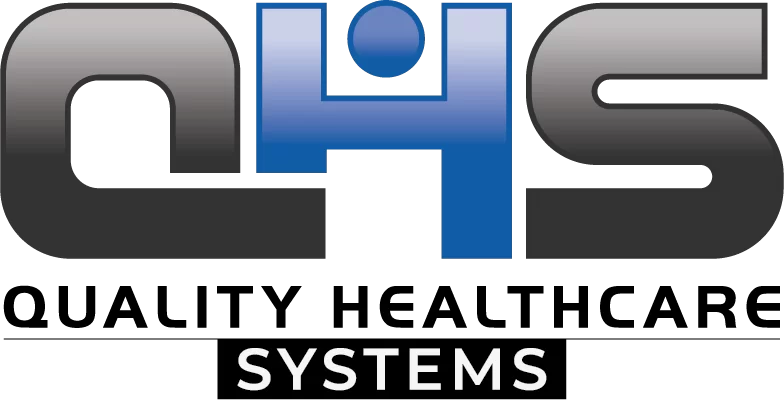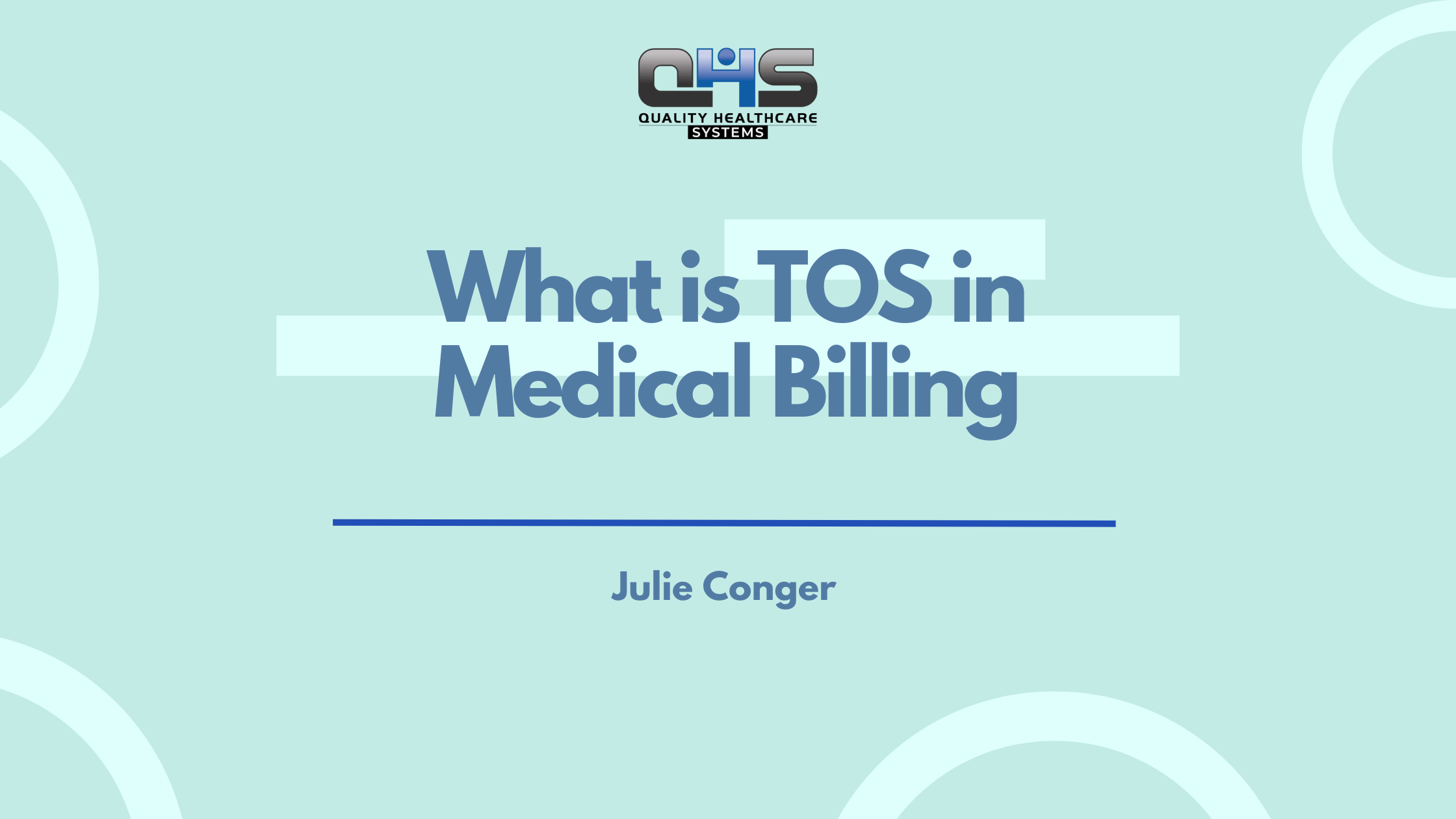What is TOS in Medical Billing and Why Is It Important?
In medical billing, TOS stands for, “Type of Service” that refers to a two-digit code used to categorize the type of service a healthcare provider delivers to a patient. This classification is crucial for processing insurance claims and ensuring that services are accurately reimbursed by payers, including Medicare, Medicaid, and private insurers.
TOS codes help insurance companies, including government payers like CMS (Centers for Medicare & Medicaid Services), identify and validate the services rendered. These codes work in conjunction with other billing codes such as CPT (Current Procedural Terminology) and HCPCS (Healthcare Common Procedure Coding System), which describe the specific procedures or services provided.
For healthcare providers, understanding and accurately applying TOS codes is vital for compliance and accurate reimbursement. Incorrect TOS usage can lead to payment delays, denials, or even compliance violations, which may impact both revenue and regulatory standing.
Therefore, mastering the proper application of TOS codes plays a fundamental role in maintaining a compliant and efficient medical billing system.
What Are the Most Common Types of Service (TOS) Codes and Their Meanings?
The TOS (Type of Service) codes are used to classify different categories of healthcare services for billing and reimbursement purposes. Below are some of the most common TOS codes:
-
TOS Code 01 – Medical Care: This code is used for general medical services such as routine checkups or preventive care. For instance, a routine physical examination would fall under this code. It helps streamline claims for basic healthcare services and is commonly used for regular patient visits.
-
TOS Code 02 – Surgery: This code applies to surgical procedures, whether inpatient or outpatient. For example, a patient undergoing a knee surgery would be categorized under this TOS. It supports accurate claims for surgical services and aids in the correct processing of reimbursement.
-
TOS Code 03 – Consultation: This code is used when a healthcare provider offers consultative services. A referral from a primary care physician to a specialist would be an example of this code. It ensures that consultations are reimbursed correctly by insurance providers.
CMS (Centers for Medicare & Medicaid Services) publishes and regularly updates the TOS code list, ensuring healthcare providers can stay up-to-date with proper classifications. These codes simplify the communication between providers and payers, leading to faster and more accurate claims processing.
For more details on the full TOS code list, visit the CMS website.
Type of Service (TOS) Codes
| TOS Code | Description | Example Services |
|---|---|---|
| 01 | Medical Care | Office visits, routine check-ups |
| 02 | Surgery | Appendectomy, orthopedic surgery |
| 03 | Consultation | Specialist consultations |
| 04 | Diagnostic X-Ray | Chest X-ray, bone imaging |
| 05 | Diagnostic Laboratory | Blood tests, urinalysis |
| 06 | Radiation Therapy | Radiation treatment for cancer |
| 07 | Anesthesia | General anesthesia for surgical procedures |
| 08 | Surgical Assistance | Assistant surgeon services |
| 09 | Other Medical Services | Chiropractic care, nutrition counseling |
| 10 | Durable Medical Equipment (DME) | Wheelchairs, crutches |
| 11 | Physical Therapy | Rehabilitation services |
| 12 | Occupational Therapy | Fine motor skills rehabilitation |
| 13 | Speech Therapy | Voice and language therapy |
| 14 | Diagnostic Testing (other) | EEG, ECG |
| 15 | Acute Inpatient Hospital | Hospital stays for acute conditions |
| 16 | Chronic Inpatient Hospital | Long-term care stays |
| 17 | Home Health Services | Nursing care at home |
| 18 | Hospice Services | End-of-life care support |
How Do TOS Codes Affect Medical Billing and Claims Processing?
TOS codes play a crucial role in the claim submission process by classifying the type of service provided. When a provider submits a claim, payers use the TOS codes to validate medical necessity and ensure that the service aligns with the patient’s insurance policy benefits. For example, if a service is marked with TOS code 02 (Surgery), the payer will check whether the procedure is covered under the patient’s plan and if it meets the required medical criteria for reimbursement.
These codes also help determine reimbursement accuracy. Payers match the TOS code with the corresponding CPT or HCPCS codes to calculate the amount to be reimbursed. Incorrect TOS usage can result in errors, leading to claim denials or underpayment. For instance, using TOS code 01 (Medical Care) for a surgical procedure would cause a mismatch, potentially resulting in the claim being denied or reimbursed incorrectly.
- Also Read: Best Denial Management Companies in USA
Staying current with TOS guidelines and payer-specific rules is critical for billing staff. If the TOS codes are outdated or misapplied, it can lead to delays in processing, compliance issues, or revenue loss. By understanding and correctly applying TOS codes, medical billing teams can ensure smoother claims submission, accurate reimbursements, and better denial management.
How Do TOS Codes Help Prevent Billing Errors and Identify Fraud?
TOS codes are essential for verifying claim integrity and maintaining billing accuracy. Insurance companies use these codes to review the alignment between the services provided and the codes submitted. Mismatched codes—such as using TOS 02 (Surgery) for an office consultation—can raise red flags during claims reviews, signaling potential errors or fraudulent activity.
Related Posts:
- Medical Billing for Artificial Limbs
- Medical Billing for Orthopedic Support
- Medical Billing for Hemipelvectomy Prosthetic
- Medical Billing for Spinal Orthoses
- Prosthetic Billing for Lower Limbs
The use of TOS codes also helps detect common billing fraud tactics, such as upcoding, unbundling, or submitting inappropriate procedures. For example, if a service is coded as a complex surgical procedure but was actually a simple consultation, the discrepancy could be flagged during audits, leading to investigations into potential medical billing fraud.
Read:
| ICD code for ankle fracture |
| ICD code for Hip Fracture |
| ICD-10 Code For L2 Compression Fracture |
| ICD-10 Code For Right Wrist Pain |
CMS (Centers for Medicare & Medicaid Services) regularly conducts compliance audits to ensure that billing practices follow proper protocols. By applying accurate and clean TOS coding, healthcare providers can avoid claims rejections, delays, and legal trouble. Proper coding also minimizes the risk of duplicate billing, where the same service might be billed multiple times, inadvertently or fraudulently.
Ultimately, using correct TOS codes ensures that healthcare practices maintain compliance with regulations, avoid penalties, and expedite payment processing, ensuring both financial stability and legal adherence.
What Tools or Software Help Accurately Manage TOS Codes in a Practice?
Several medical billing software solutions help manage TOS codes accurately, such as Kareo, AdvancedMD, and Practice Fusion. These tools offer features like automated code matching and integrated TOS lookups, reducing errors. For example, Kareo automatically suggests TOS codes based on entered CPT codes, streamlining the process.
AdvancedMD includes payer rule alerts, notifying users if a TOS code doesn’t align with payer requirements. EHR-integrated systems minimize human error by linking patient records to billing info, speeding up claim submission and reimbursement.
Regular software updates ensure TOS code lists stay current, preventing denials. Using these tools helps practices manage medical billing time limits, ensuring timely claims and payments while staying compliant.
What Are the Challenges in Managing TOS Codes and How Can Providers Overcome Them?
Managing TOS codes comes with challenges like overlapping codes, frequent CMS updates, and payer-specific interpretations. These factors can lead to errors in claim submission, causing denials or underpayments. For instance, some codes may overlap, making it difficult to choose the correct one, while frequent updates from CMS require providers to stay current.
To overcome these challenges, providers should implement regular staff training to ensure familiarity with code changes and payer rules. Maintaining updated billing manuals and using claim scrubbing tools can catch errors before claims are submitted. Internal audits are also crucial for ensuring compliance and accuracy.
A proactive approach helps prevent billing mistakes and supports a higher patient retention rate, as accurate and timely billing enhances patient satisfaction and trust.
How Are TOS Codes Used in Data Analytics and Healthcare Policy?
TOS codes play a vital role in data analytics by tracking healthcare trends, utilization rates, and costs. Aggregated TOS data helps government agencies and payers, including CMS, to identify patterns and inform policy decisions.
For example, during the COVID-19 pandemic, an increase in TOS 05 (lab diagnostics) codes for testing helped shape policy, leading to expanded coverage for COVID testing.
This data also supports population health initiatives by allowing policymakers to assess the need for services and allocate resources effectively. By examining TOS code trends, risk stratification models can be refined to target high-risk populations and optimize care delivery.
Providers can use TOS data for benchmarking their performance, evaluating service utilization, and making data-driven decisions for care planning. It aids in identifying areas for performance improvement and ensuring that services align with both patient needs and cost-efficiency goals.
Why Should Practices Partner with a Professional Medical Billing Company for TOS Accuracy?
Partnering with a professional billing company like QHS Health ensures accurate TOS coding, fewer denials, and faster reimbursements. Our team stays updated on CMS changes, payer-specific rules, and denial patterns, reducing errors and compliance risks. QHS handles everything from coding to claim follow-ups, easing staff workload and improving cash flow.
With expertise in RCM and TOS compliance, we help practices focus on patient care while we manage the back-end efficiently. Whether you’re a small clinic or a busy specialty practice, QHS provides scalable billing support that maximizes revenue and ensures every claim is correctly coded the first time.
Also Read:
| ICD-10 Code for Dysuria: Diagnosis, Billing, and Guidelines |
| ICD-10 Code for Chest Discomfort: Diagnosis, & Billing Guidelines |






